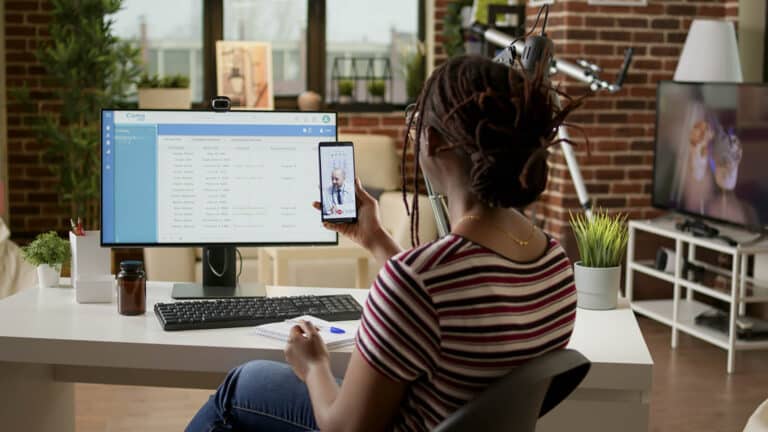While the teleworking trend has gained prevalence in recent years, the COVID-19 pandemic and subsequent lockdowns forced companies across the globe to switch to working remotely almost overnight.
For the most part, businesses not connected to recreation and tourism have succeeded in conserving and even exceeding productivity levels but people working from home no longer have the distinct separation between work and personal lives and this, in turn, comes with implications.
Although the pandemic has undoubtedly upended most people’s ordinary lives, remote workers need to maintain a healthy work-life balance for the sake of their wellbeing.
Impact of Teleworking
While the immediate health benefits of avoiding collective work environments are apparent, it is crucial to take into consideration the mental health ramifications that can come with working remotely.
According to a national study conducted by The Lancet Psychiatry in the UK, the outbreak could have a “profound” impact on individuals’ mental health. Their findings were published in a public journal on their website “Mental health before and during the COVID-19 pandemic“.
Unsurprisingly, by late April 2020, the mental health of the country deteriorated compared with pre-COVID-19 trends. The Lancet Psychiatry contributes this decline to the pandemic-induced ‘impact on employment, livelihoods, income and personal debt, coupled with substantial amount of worry about future insecurity.’ And the same adverse effects have been felt throughout the rest of the globe too.
A July 2020 survey by FlexJobs and Mental Health America (MHA), said that 75% of people have suffered burnout at work. With 40% of respondents experiencing burnout during the pandemic in particular, as a result of 37% of people working more hours than usual since the rise of the pandemic. Additionally, 18% of employed workers are more than three times as likely to report poor mental health now versus 5% before the outbreak.
Many people may encounter unforeseen mental health implications from working from home; staying aware of this is crucial. Isolation and burnout are two areas of concern, while transitioning from work to home may also pose a challenge when working and living in the same space. All things considered, the significance of a personal and professional balance to people’s wellbeing remains paramount.
Maintaining the Balance
Most people working remotely will experience the lines between personal and work-life blur; parents with children who can’t go to school may face additional challenges with the likes of home-schooling. Employees need to take the lead on maintaining their wellbeing within their home workspace.
Here are some things remote workers can do to maintain the balance.

Take Frequent Breaks
Employees may feel compelled to work for extended periods and put in long hours to prove their efficiency while working from home – especially with less after-work extracurricular activities.
Taking frequent breaks is not only a great way to pause during the workday but is also crucial to keeping the stress to a minimum. If possible, incorporate exercise breaks and social interaction into your daily work routine; a simple walk around the block to clear your mind or a quick virtual coffee-chat with a colleague or friend are effective ways to disengage your brain for a while.
For parents who are teleworking and also have the added responsibility of home-schooling or child-care during their work day, alternating between caregivers is a great way to ensure both work and family receive equal, focused time. For instance, prioritise to give 100% of your attention to either work or the kids for a certain period. Eliminate the temptation to multi-task, instead making sure work doesn’t interfere with ‘kids-time’, and vice versa.

Establish Transition Times
Remote employees need to mentally detach from work at the end of the day. However, with no office and a daily commute that is substituted with a short walk from the bedroom to your workspace, it can be challenging to maintain a clear separation between professional and personal time.
Routines are helpful to define clear boundaries. Having a set cut-off time allows your brain to ease into your personal life and relax into the evenings and weekends. Simple efforts like turning off email notifications before and after work, as well as ensuring you get enough sleep, can create a greater sense of normalcy.

Combat Isolation
Even in pre-COVID times, the consequences of loneliness and isolation shouldn’t be understated. In fact, research shows it can be “twice as harmful to physical and mental health as obesity.”
A primary issue is the need to sustain relationships with co-workers. This is critical to job performance, as well as emotional and mental wellness. Be proactive in establishing safe social opportunities; as we have already seen, technology has provided countless virtual platforms with which to communicate.
To alleviate feelings of isolation, some organizations such as GitLab promote ‘virtual coffee breaks’ during work hours for their remote team to cultivate collaboration and provide a more satisfactory work environment.
It is essential to human wellbeing to maintain a sense of community and connection. We are social creatures by design, and although we may not be able to be with the our friends and family in person, we should factor in time for socialization often. Whether this is a virtual catch-up call, or simply hanging around in the “meeting room” for just a while longer for some casual chit-chat.
Limit Screen Time
We already know that excessive screen time is not good for our health, however,8 at the first signs of the outbreak the importance of our technological devices intensified. With lockdown in effect in countries all over the world, people instantly depended on their devices for possibly every aspect of their working and social lives. Making the time to “switch-off” regularly and take a tech-free moment will remedy the feeling of always being in work-mode.

Adapting to the New Normal
During this time of uncertainty, occupational health, whether at home or the office, should take first place for both employees and employers. Remote workers need to recognize that while at home, maintaining the balance of their lives is up to them.
Setting a reasonable work schedule, factoring in time for necessities, establishing achievable goals, and making an effort to stay connected, all support a well-balanced lifestyle. The COVID-19 pandemic will eventually reach its end, and then, perhaps, it will be business (and leisure) as usual.












